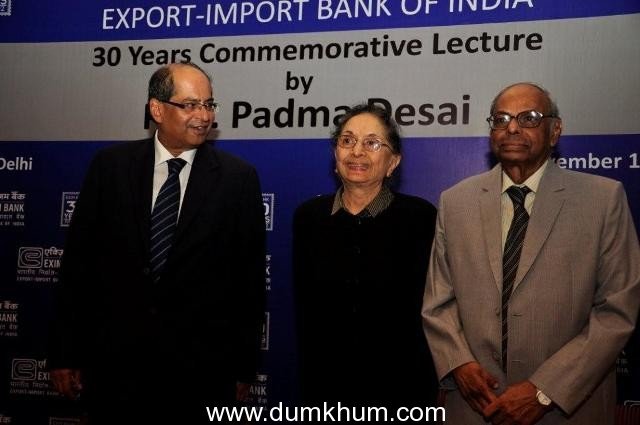Dr. C. Rangarajan, Prof. Dr. Padma Desai speak at Exim Bank’s 30 Years’ Commemorative Lecture Series on ‘The Global Financial Crisis: Causes and Consequences’
New Delhi : Prof. Padma Desai speaks at Exim Bank’s 30 Years’ Commemorative Lecture Series on ‘The Global Financial Crisis: Causes and Consequences.’ Dr. C. Rangarajan, Chairman, Economic Advisory Council to the Prime Minister, Government of India, presides over the Lecture.
“2008-09 crisis originating in the US shows that financial globalization has been a mixed blessing for emerging market economies,” says Prof. Desai
Export-Import Bank of India (Exim Bank), the premier export financing institution integrating India’s foreign trade and investment with economic growth, organized a 30 Years’ Commemorative Lecture by Prof. Padma Desai (Professor of Comparative Economic Systems & Director of the Center for Transition Economies, Columbia University, USA) in New Delhi on Monday, November 19, 2012. Prof. Desai spoke on the topic “The Global Financial Crisis: Causes and Consequences”.
Dr. C. Rangarajan (Chairman, Economic Advisory Council to the Prime Minister Government of India) presided over the lecture hosted by T. C. A. Ranganathan (Chairman & Managing Director, Export-Import Bank of India).
Dr. C. Rangarajan, Chairman, Economic Advisory Council to the Prime Minister Government of India, said, “I am indeed very grateful to Dr. Padma Desai for her extremely useful presentation on the developments since 2008. The immediate trigger for the Global Financial Crisis was of course the subprime market crisis and that is where the problem started. One lesson to be learnt from the financial crisis is the need for regulation of the financial systems. There is a demand for regulation of the financial institutions but I believe that there should be a proper balance, especially in a developing economy.”

Speaking about Exim Bank’s 30 Years’ Commemorative Lecture Series, Mr. T.C.A. Ranganathan, CMD, EXIM Bank, said, “It is my pleasure to inform you that our Bank has completed 30 years of operations this year. To commemorate this important milestone and our three decades of service to the Indian export fraternity, we are organising a series of lectures by eminent speakers. These lectures would be focusing on the broad theme of trade and development. The first lecture of the series was delivered by Dr. Kaushik Basu, Chief Economic Adviser, Government of India, Ministry of Finance, earlier this year and today we have Prof. Padma Desai’s lecture presided over by Dr. C. Rangarajan, Chairman, Economic Advisory Council to the Prime Minister, Govt. of India.”
Prof. Padma Desai, in her presentation titled ‘From Financial Crisis to Global Recovery, touched upon the reasons for the crisis; its impact on the global economy and the immediate measures taken as well as the monetary & allied policy responses. “The severity of the negative impact in GDP growth rates of various countries between 2009 and 2010 depended on whether they were export dependent, how their banking systems were managed, and whether these economies had budgetary surpluses in the immediate pre-crisis period. A major lesson of the crisis, which originated in America, is that financial globalization has been a mixed blessing for emerging market economies,” said Prof. Desai.
Referring to Prof. Desai’s Lecture, Mr. Ranganathan said, “Over the last few years, the global economy has witnessed several economic and financial crises, in different regions and of different magnitudes. As a fall-out of these crises, in especially advanced economies like US and other European economies, which have traditionally been India’s major trading partners, our economy is still facing several challenges of depressed export demand, together with the dual pressures of inflation and slowing growth. However, cross-country comparison has revealed that the Indian economy still remains among the front-runners. Prof. Padma Desai’s lecture based on the theme of ‘Global Financial Crisis: Causes and Consequences’ highlighted many pertinent issues on the topic.”
Export-Import Bank of India (Exim Bank) was set up in 1982 by an Act of Parliament for the purpose of financing, facilitating and promoting India’s foreign trade. It is the principal financial institution in the country for coordinating the working of institutions engaged in financing exports and imports. Exim Bank is fully owned by the Government of India and the Bank’s authorized and paid up capital are Rs. 10,000 crore and Rs. 2,300 crore respectively.
The Bank provides financial assistance to export-oriented Indian companies by way of term loans in Indian rupees or foreign currencies for setting up new production facilities, expansion/modernization or upgradation of existing facilities and for acquisition of production equipment or technology. The Bank lays special emphasis on extension of Lines of Credit (LOCs) to overseas entities, national governments, regional financial institutions and commercial banks. The Bank also extends Buyers’ credit and Suppliers’ credit to finance and promote country’s exports.
To promote hi-tech exports from India, the Bank has a lending programme to finance research and development (R&D) activities of export-oriented companies. The Bank has put in place an Export Marketing Services (EMS) Programme to assist Indian companies in identification of prospective business partners, facilitating placement of final orders and also identification of opportunities for setting up plants or projects or for acquisition of companies overseas. The service is provided on a success fee basis.
Exim Bank supplements its financing programmes with a wide range of value-added information, advisory and support services, which enable exporters to evaluate international risks, exploit export opportunities and improve competitiveness, thereby helping them in their globalisation efforts.










